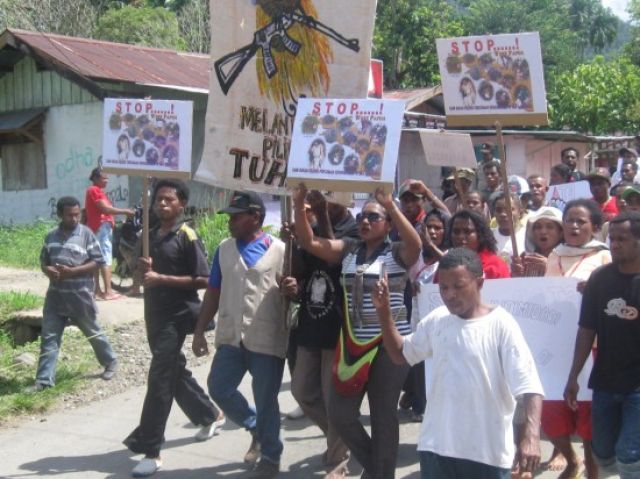
West Papua has been rocked by a wave of shootings and repression in recent weeks that has left many parts of the occupied nation in a state of fear.
Indonesian security forces went on a rampage in the highlands town of Wamena, killing one person, injuring many others and destroying property on June 6.
Human rights group Tapol said on June 8 the soldiers were seeking revenge for an attack by locals on two colleagues who had run over a three-year-old child with a motorbike. Locals killed one of the soldiers on the motorbike and the other was severely beaten.
The Jakarta Post said on June 8 that soldiers from the Yonif 756/Wamena battalion stormed the streets of Wamena, setting fires, killing livestock, shooting at random and vandalising homes after learning of the incident.
The rampage was followed by another killing the next day in the capital Jayapura. New Matilda said on June 12 that West Papua National Committee (KNPB) activist Teyu Tabuni was shot four times in the head by a police officer, who then fled.
Police offered several alternative explanations for the killing. These included that Tabuni was hit by a warning shot after he ran to avoid arrest for allegedly "shaking down" passers-by, the Jakarta Globe said on June 7.
This killing was part of wave of shootings in Jayapura that began on May 29, when a German citizen, Pieter Dietmar Helmut, was shot on a popular beach by an unknown assailant. Many others shootings have been seemingly random, wounding or killing ordinary Papuans, students, police and public servants.
The Jakarta Post said on June 13 that normal activity in Jayapura had been disrupted by the shootings and many residents were living in fear.
Indonesian police have blamed most of these attacks on the armed wing of the Free Papua Movement (OPM). The OPM has waged a low-level struggle against occupying Indonesian forces for decades.
OPM leader Lambert Pekikir has denied any involvement, the online magazine Jubi said on June 12. “Such actions are simply not on our agenda,” he said.
A spokesperson for human rights group Kontras Olga Helena Hamadi questioned the seeming lack of investigation by authorities, saying: “It is strange that all these shootings are occurring in the heart of the city, yet not one of the perpetrators has yet been arrested.”
Human rights activist Sebby Sambom claimed the shootings were part of a plot to discredit the West Papuan independence movement, Jubi said on June 1. Sambom said Helmut's shooting “was clearly the work of a Papuan who is now in the pay of the Indonesian government”.
Sambom said the Indonesian government used armed groups of Papuans loyal to Indonesia to stir up conflict.
A rally in Jayapura on June 4 calling for a proper investigation into Helmut's shooting was attacked by police, killing one activist and injuring others, a report published by Tapol said on June 8.
Looking for a scapegoat to justify their brutality, police arrested KNPB chairperson Buchtar Tabuni along with two colleagues on June 7 for organising “anarchic” protests, Bintang Papua said that day. Tabuni is a former political prisoner who was released last year after a three-year sentence for organising a rally in 2008.
Another KNBP leader, Mako Tabuni, was also shot dead by Australian-backed Detachment 88 “anti-terrorist” soldiers on June 14 West Papua Media said that day. Police then accused Tabuni of being behind the shootings and said they were hunting other members of the KNBP, Bintang Papua said on June 14.
Indonesian President Susilo Bambang Yudhoyono has come under rising pressure to deal with the security situation in West Papua. The mainstream press and several politicians have questioned the government's perceived lack of control and inability to solve any of the murder cases.
Unwilling to criticise the repressive activities of the military, Yudhoyono chose to play down the violence.
The June 13 Jakarta Post reported Yudhoyono said: “The recent incidents in Papua can be considered small-scale, with a limited number of casualties. They are far too minor if we compare them to the violence in the Middle East, where deadly attacks with so many fatalities occur almost every day.”
Another wave of repression by Indonesian forces has hit Yapen Island, north of the Papuan mainland, on May 29, West Papua Media said on May 31. The repression came after a series of peaceful protests from locals condemning ongoing acts of violence, terror and intimidation by Indonesian forces.
WPM said on June 6: “Witnesses have alleged that a joint-force of Indonesian Army (TNI), Brimob commandos and the elite counter-terrorism force Detachment 88 (trained and funded by the Australian Federal Police) are intensifying their ongoing 'sweeping' against peaceful political activists and ordinary villagers.”
Property was vandalised and possessions were confiscated.
The self-declared government of the Federated Republic of West Papua said on June 8 hundreds of houses had been burned in the villages of Angkaserai, Mantembu and Menawi, and about 1500 people had fled to the regional capital of Serui. The villagers gathered outside the regional parliament hoping for protection.
The jungle headquarters of the Yapen branch of the OPM was also raided, WPM said. Fighters were ordered not to respond with violence to the attack, citing concerns for the safety of locals.
Journalists in Yapen were also threatened by police for reporting on the protests that sparked the crackdown, Jubi said on June 2.
The crackdowns across the country show Indonesia's unwillingness to change tack, despite higher international scrutiny of human rights abuses in West Papua in recent years. The brutality of security forces is only likely to raise the Papuan calls for independence that Indonesia seeks to suppress.
